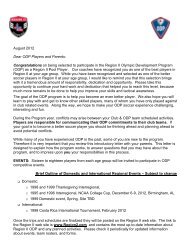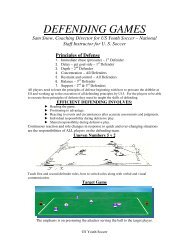Can a club train a coach to become a leader - US Youth Soccer
Can a club train a coach to become a leader - US Youth Soccer
Can a club train a coach to become a leader - US Youth Soccer
You also want an ePaper? Increase the reach of your titles
YUMPU automatically turns print PDFs into web optimized ePapers that Google loves.
Ten Qualities of Leadership<br />
<strong>Can</strong> a <strong>club</strong> <strong>train</strong> a <strong>coach</strong> <strong>to</strong> <strong>become</strong> a <strong>leader</strong>? <strong>Can</strong> a person develop <strong>leader</strong>ship abilities? The<br />
answer is a resounding YES. Leadership is a combination of specific personal qualities. It begins<br />
inside a person and relies as much on philosophical approach as it does on learned skills.<br />
COURAGE<br />
Have the courage of your convictions, is a familiar saying. Leaders must have a strong belief<br />
system <strong>to</strong> boldly meet soccer’s challenges and maintain the courage of their convictions. Believing<br />
in their own physical, emotional, intellectual and spiritual standards and values enables them <strong>to</strong><br />
apply all their resources and creative energy when faced with problems or overwhelming odds.<br />
BIG THINKER<br />
Leaders have the ability <strong>to</strong> see things in a larger perspective, and also <strong>to</strong> see things better than<br />
they are. Curiosity is essential! Many <strong>leader</strong>s have “divine discontent.” They challenge tradition.<br />
They are not afraid of idealism, and are eager <strong>to</strong> create and bring out the best in others. Coaches<br />
have clearly defined their personal goals and have the ability <strong>to</strong> help others expand their thinking<br />
and imagination.<br />
CHANGE MASTER<br />
Leaders move people and things in directions more beneficial <strong>to</strong> all. Coaches not only have the<br />
ability <strong>to</strong> create change, but they also accept, handle and succeed during times of change.<br />
Change is welcome since they learn from the past and let it go. Leaders don’t burden themselves<br />
with old ideas, prejudices, habits or processes. The inspired <strong>leader</strong> looks for the opportunity in<br />
change and tries <strong>to</strong> understand it even if he/she doesn’t like it. The Serenity Prayer is a guiding<br />
tenant: God grant me the serenity <strong>to</strong> accept the things I cannot change, courage <strong>to</strong> change the<br />
things I can and the wisdom <strong>to</strong> know the difference.<br />
PERSISTENT AND REALISTIC<br />
A <strong>leader</strong> sets realistic goals and sees them through <strong>to</strong> completion. Even when under pressure they<br />
remain committed <strong>to</strong> those goals. Current struggles are acknowledged as essential for future<br />
achievement, and <strong>coach</strong>es will sacrifice immediate satisfaction for future gains. They also help<br />
others overcome obstacles because they realize that patience is a good measure of persistence.<br />
Leaders do not quit!
SENSE OF HUMOR<br />
It is said, “If you take yourself <strong>to</strong>o seriously, no one else will.” A sense of humor is the key.<br />
Coaches know that life and soccer are no joking matter, but they have the ability <strong>to</strong> keep things in<br />
perspective. They are self-accepting. They can laugh at themselves. They have enthusiasm.<br />
Leaders are spontaneous and can express their feelings. Their ready wit lightens the load of all<br />
those around with whom they associate. When stress and pressure <strong>become</strong> a problem, the<br />
<strong>leader</strong>’s sense of humor gives everyone a momentary “emotional vacation” so that the task or<br />
situation can continue with balance and clear direction.<br />
RISK TAKER<br />
Taking risks is a vital part of <strong>leader</strong>ship. Leaders have the courage <strong>to</strong> begin while others are<br />
waiting for better times, safer situations and assured results. They are willing <strong>to</strong> take the risk<br />
because they know that overcautiousness and indecision are robbers of opportunity and success.<br />
They are willing <strong>to</strong> fail in order <strong>to</strong> succeed. Coaches know that no one wins all the time and<br />
winning is not always the goal. They take initiative, are independent, and are not unduly influenced<br />
by others. Leaders allow themselves and others <strong>to</strong> grow by making mistakes and not expecting<br />
perfection.<br />
POSITIVE AND HOPEFILLED<br />
Eighty percent of success in life is having a positive attitude. Coaches have the ability <strong>to</strong> see the<br />
good in a bad situation, <strong>to</strong> see hope where others do not and <strong>to</strong> have faith when others give up.<br />
They know that one person with a belief is equal <strong>to</strong> ninety-nine who only have an interest. They<br />
are optimistic and can elicit the same from other people. They trust themselves and others.<br />
Leaders know that everyone wants <strong>to</strong> make a difference, accomplish something in soccer, be<br />
accepted and receive acknowledgement for their skills and talents. The <strong>leader</strong> takes action <strong>to</strong><br />
reinforce a person’s self worth and value, in a positive and hopefilled manner.<br />
DECISION MAKER<br />
Deciding <strong>to</strong> decide is often harder than carrying through once the decision has been made.<br />
Leaders know that not deciding is still a decision made by time, fate and circumstance. The <strong>leader</strong><br />
is vitally aware of this and would rather make a wrong decision than none at all. Few decisions in<br />
life are so critical that they cannot be corrected. If that is true for life then for soccer it is doubly so.<br />
Leaders know that indecision wastes time, energy, talent, money and opportunity. They make<br />
decisions and commitments <strong>to</strong> avoid future failures. Coaches are also willing <strong>to</strong> make decisions<br />
and plans that affect future generations, because they know that indecision will forfeit everyone’s<br />
future.
ACCEPTS AND <strong>US</strong>ES POWER WISELY<br />
Leaders do not shrink from power, nor do they seek it unnecessarily. They know that having clout<br />
often intimidates others, so they use power judiciously. They “pull rank” only in emergencies.<br />
Leaders use their power <strong>to</strong> direct others <strong>to</strong> help them achieve their full potential. Coaches take<br />
responsibility for themselves, their actions and the results. They use their personal power <strong>to</strong> instill<br />
this example in others. Power and greatness is not a goal, but a by-product of learning how <strong>to</strong><br />
serve. This they do gladly!<br />
COMMITTED<br />
Commitment is the primary word for <strong>coach</strong>es. They realize that without it, all else is meaningless.<br />
They have a zeal and dedication <strong>to</strong> their cause that pulls others <strong>to</strong> them. Their commitment<br />
exudes confidence and hope. Leaders set high standards of excellence for themselves and others,<br />
and people grow <strong>to</strong> those expectations. Leaders determine a course, make a plan and then have<br />
the self-discipline <strong>to</strong> follow through in spite of obstacles. Coaches stay in the game long after the<br />
others give up. Most people quit <strong>to</strong>o soon, missing the riches of life. Just like the seasons, life and<br />
soccer have cycles. The <strong>leader</strong>’s commitment is sustained through the good and bad, hot and<br />
cold, ups and downs. Although <strong>coach</strong>es are committed <strong>to</strong> their goals, they live only for one day at<br />
a time and know that if they take care of <strong>to</strong>day, <strong>to</strong>morrow will take care of itself.<br />
QUALITIES OF A LEADER<br />
1. Positiveness<br />
2. Servanthood<br />
3. Growth Potential<br />
4. Follow-Through<br />
5. Loyalty<br />
6. Resiliency<br />
7. Integrity<br />
8. “Big Picture” mind set<br />
9. Discipline<br />
10. Gratitude
Three types of people in life<br />
Specta<strong>to</strong>rs – afraid of winning… they do not want the responsibility associated<br />
with winning.<br />
Losers – are more interested in what everyone thinks about them and spend<br />
most of their time trying <strong>to</strong> please or be like someone else.<br />
Losers always criticize others.<br />
Losers look for company by complaining.<br />
Most of all, losers put themselves down.<br />
Winners – spend their energy in positive ways of enhancing life for themselves<br />
and for those around them. Winners take their God given talents and put them <strong>to</strong><br />
use in reaching goals, which they set for themselves. Winners realize a sense of<br />
joy in their accomplishments and understand that success comes from effort as<br />
well as results.


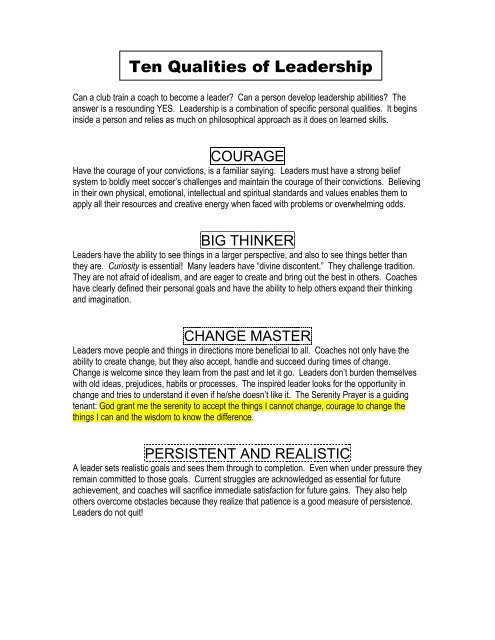
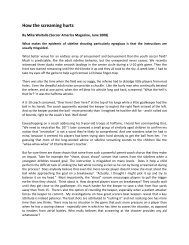


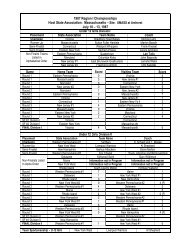



![Informational Letter attached to letter 8/28/2013 [PDF] - US Youth ...](https://img.yumpu.com/47952957/1/190x245/informational-letter-attached-to-letter-8-28-2013-pdf-us-youth-.jpg?quality=85)


